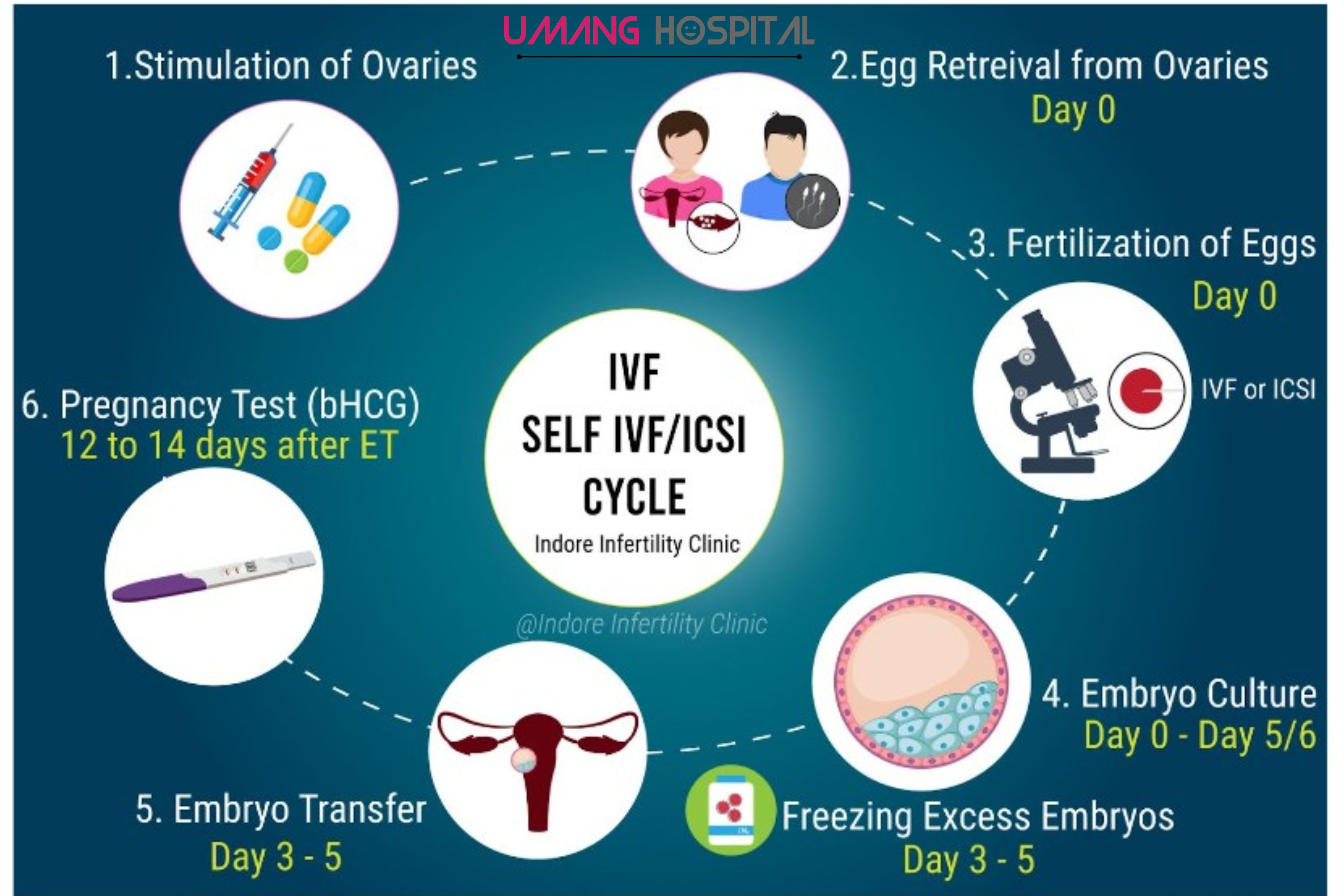
INFERTILITY: CAUSES AND EVALUATION
Infertility is the inability to conceive after a year of regular, unprotected intercourse. However , patients with known factors of subfertility like advanced age, PCOS, abdominal surgeries, hormonal imbalances etc may need evaluation after six months of active married life.The causes of infertility include various factors affecting either the male or female reproductive systems, or both. These factors include ovulation disorders, blocked fallopian tubes, endometriosis, hormonal imbalances, sperm abnormalities, and age-related decreased ovarian reserves.
Causes of Infertility:
Female Factors:
Ovulation Disorders:
Conditions like Polycystic Ovary Syndrome (PCOS) disrupt or prevent the release of eggs from the ovaries, leading to irregular or absent periods.
Fallopian Tube Problems:
Blockages or damage to the fallopian tubes, often caused by infections like Pelvic Inflammatory Disease (PID) or endometriosis, prevent sperm from reaching the egg or the fertilized egg from reaching the uterus.
Endometriosis:
This condition involves the growth of uterine lining tissue outside the uterus, affecting ovarian function, hormone balance, and implantation.
Uterine Issues:
Abnormalities in the uterus, such as fibroids or polyps, can interfere with implantation or block the fallopian tubes.
Hormonal Imbalances:
Conditions affecting the hypothalamus, pituitary, or thyroid glands can disrupt the menstrual cycle and ovulation.
Age-Related Decline:
Fertility in women decreases with age, particularly in the late 30s and 40s, due to a decline in the quantity and quality of eggs.
Male Factors:
Sperm Abnormalities: Issues with sperm count, motility (movement), or morphology (shape) can impair their ability to fertilize an egg.
Ejaculation Problems: Retrograde ejaculation, where semen enters the bladder instead of being expelled, can affect fertility.
Hormonal Imbalances: Hormonal issues can impact sperm production.
Varicocele: Swelling of the veins around the testicle can affect sperm production.
Environmental Factors: Exposure to toxins, heat, or radiation can also negatively impact sperm production and function.
Other Factors:
Combined Infertility:
In some cases, both partners may have factors contributing to infertility.
Unexplained Infertility:
In a subset of couples, despite investigations, the cause of infertility remains unknown.
Lifestyle Factors:
Smoking, excessive alcohol consumption, obesity, and excessive exercise can also contribute to infertility.
Medical Conditions:
Certain autoimmune disorders, diabetes, and other medical conditions can also affect fertility.
Female fertility test :
Medical History and Physical Examination:
A thorough review of the individual's or couple's medical history and a physical examination are essential for identifying potential causes of infertility.
Pelvic ultrasounds can help visualize the uterus and ovaries, looking for abnormalities.
Hormone Testing: Blood tests to assess levels of follicle-stimulating hormone (FSH), luteinizing hormone (LH), estradiol, progesterone, and other relevant hormones like prolactin and AMH (Anti-Mullerian Hormone).
Ovulation Testing: Blood tests to determine if a woman is ovulating regularly and when.
Ultrasound assisted ovulation testing
Hysterosalpingography (HSG): An X-ray procedure using a contrast dye to check the uterus and fallopian tubes for blockages or structural issues.
Sonosalpingography: A type of ultrasound where fluid is inserted into the uterus to better visualize the uterine lining and also study the patency of the tubes.
Hysteroscopy:A procedure where a thin, lighted scope is inserted into the uterus to directly visualize the uterine cavity.
Laproscopy: A surgical procedure involving small incisions followed by insertion of laparoscopy in the abdominal cavity to examine the pelvic organs, tubal patency and identify potential issues like endometriosis or pelvic adhesions.
Ovarian Reserve Testing: Assessing the quantity and quality of a woman's eggs.
Thyroid Function Test: Blood test to check for thyroid hormone imbalances that can affect fertility.
Special tests if needed
Male Infertility Testing:
Semen analysis :A crucial test to evaluate sperm concentration, motility, morphology, and overall sperm health.
Hormone Testing:
Blood tests to assess testosterone levels and other hormones related to male reproductive health.
Genetic Testing:
In some cases, genetic tests may be performed to identify any underlying genetic factors contributing to male infertility.
Imaging studies
Advanced sperm function test
Sperm DNA fragmentation index
Understanding the potential causes of infertility is crucial for diagnosis and appropriate treatment. At Umang IVF and superspeciality hospital we have the facility of all fertility tests under one roof. The tests are evaluated by our expert team of doctors , who thereafter give genuine guidance regarding the fertility treatment options.